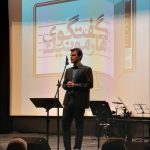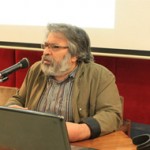
Mohsen Renani in the preface of his book entitled “The Political Economy of nuclear conflict; an introduction to traversing the civilizations” writes:
” … it is surprising; people whose average intelligence quotient (IQ) is 84 (compared to normal range of 90-100) and are in the class of “below average” consider themselves as the most intelligent people in the world and keep enjoying this deceptive belief and become arrogant and based on such self-delusion, repeatedly miss historic opportunity …”
In an approximate estimate of the average IQ of people in different countries in 2008, Iran compeered with countries like Saudi Arabia, Pakistan, Afghanistan, Venezuela, and Uganda (2).
Unfortunately, such reality has numerous manifestations with respect to music and its status in today’s society of Iran. Performing the 6/4 rhythm which has been known as a difficult performance is one of these countless manifestations (3).
Another manifestation is the popularity of syllabic combination of poem and music which is designated by Abdol-ghader Maragheyi (titled “Hawayee” or “Mardom-zad”) as the most inferior style of using poem in music and has been categorically dominant in Iranian music since Qajar Period up to now, a style which is the simplest way of delivering language in terms of complexity (4).
Moreover, vocal layering has also melted away in Iranian music in the course of time. Sasan Fatemi, in the 28th issue of Mahour Quarterly, in part of an article entitled “Combination of poetry and music; rule or style” writes:
“… we have come to a point that it is very unlikely to find a nation in the world like us who get easily distressed after hearing simultaneous vocal events.”
There are many other examples in this regard. It appears that during the past years, with the increase of immigration phenomenon and brain drain, as well as declining of life quality and welfare of different classes of society which could likely contribute to degradation of a complete and health diet and so forth, the average IQ of Iranian people has come to lower degrees.
Low IQ and its gradual decrease in the long run, as a contributing factor in current inactivity, together with other factors such as inefficiency and lagging of country’s educational system (which considers no place for music learning), delivers a discouraging outlook.
There is no doubt that accumulation of all these deficiencies has dramatically lowered the average quality of the music productions as well as the taste of public today; an issue that has been frequently Requiem like mentioned in articles and writings of contemporary musicians and musicologist(5)(6).
In addition to low IQ, another issue is the lack of awareness of these falls and degradations in general consumers of music. While a group of students or educated people, in decades ago, used to sing together the modest works such as “Ma-ra Beboos” and “Elahe-ye Naaz”, same groups in a moment exhausted from leisure music, now sing “To ke cheshmat kheili ghashangeh…” which is barely even a kid’s music, and like producers of such masterpieces, have this mindset that they are experiencing a distinct musical work having musical values.
It should be noted that the genre of music is of trivial importance in this regard and the problem is the low quality of such music productions in all genres. Isn’t it true that our pop music is at the most basic and preliminary level, except few ones, and is in no way comparable to much of the world’s pop music? In such atmosphere, speaking of the globalization and universalization and in some case positing of Iranian music at the summit of world’s art and wisdom is because of nothing but the illusion that Mohsen Renani has alluded to, a historical illusion which equates intelligence with trickery (7) and has deceived himself for many centuries.
Footnote
1- Economist and professor of University of Isfahan, author of books such as “The decline cycles of moral and economic” and “market or non-market?”
2- photius.com
3- A renowned professor of music once said in his classroom: “…when late Saba during his training to students, came to the song of “Aseman har shab…” (in the rhythm of six four), said everyone who can properly perform this song, has all the rhythm…”.
4- See “contemporary Tasnif”, Sasan Fatemi, Mahour quarterly, No. 40, 112-85
5- See “current music of Iran: gap between existence and manifestation”, Mohammad Reza Fayyaz, Mahour quarterly, No. 39, 102-93
6- It should be noted that like the measure of “intelligence”, average trend was considered for the quality level of music production. Obviously, there have been valuable and genius productions. However, the average quality level of music works decreases with the bulk of poor quality productions.
7- There are many established examples of trickery in Iranian music which requires a comprehensive consideration. Here, we only refer to the statement of Mohammad Reza Nikfar (philosopher and theorist): “no word other than “trickery” can best describe our national vices…” (radio Zamaneh, critical idea, program 48, Iranian trickery)









